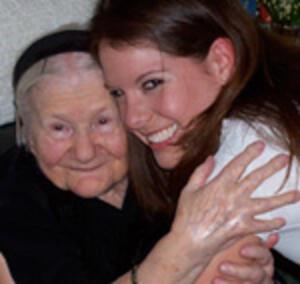Irena Sendler saves Jewish children from the Warsaw Ghetto
Irena Sendler with actress Maegan Easter in 2005.
Courtesy of Life in a Jar
On October 20, 1943, Irena Sendler threw a package out a window to a friend below, who quickly hid it under her arm. Coming up the stairs were nine Nazi soldiers, ready to arrest her for her work with the Polish underground. Sendler would be sent to the notorious Pawiak prison; there she was tortured to divulge the names of her co-conspirators and to reveal the contents of that package. The little parcel contained a list of the true identities of thousands of Jewish children whom Sendler and her team had smuggled out of the Warsaw Ghetto in 1942 and 1943, hiding them among non-Jewish families.
Born in 1910, Irena Sendler was a Catholic employee of the Warsaw Social Welfare Department when the Nazis herded hundreds of thousands of Jews into the 16-block ghetto. Joining Zegota, the Council for Aid to Jews led by the Polish underground resistance movement, Sendler enlisted workers in each of the ten centers of the Welfare Department to issue hundreds of forged documents to create new identities for Jewish children.
Sendler had agonizing discussions persuading Jewish parents to part with their children and Christian parents to shelter them; all were risking their lives if they were discovered. Some children were smuggled out in gunnysacks and bodybags, others in a mechanic’s toolbox, in ambulances, and even coffins.
Sendler enlisted the active assistance of the Church in her work. Some children were taken in one door of a church in the ghetto and emerged through another door in the free zone, exiting with new Christian identities. Irena carefully noted the true names and family members of the youngsters in code and buried the list in jars under a neighbor’s apple tree, hoping to one day dig up the jars and reunite the families.
The list was in the parcel Sendler threw out the window that day, re-buried by her compatriot. Some 2,500 children’s names were in the jars.
In Pawiak prison, the Nazi soldiers broke Sendler’s feet and legs, crippling her for life in their efforts to pry information from her. Sentenced to death, she escaped when her helpers bribed a Nazi guard and remained on the run for the rest of the war. When peace came, she dug up the jars again and used her notes to track down the children she had rescued; many had parents who were killed in the Holocaust. She never considered herself a heroine. “I could have done more,” she said later. “This regret will follow me to my death...Every child saved with my help is the justification of my existence on this Earth, and not a title to glory.”
In 1965, Irena Sendler was accorded the title of The Righteous Among the Nations by Yad Vashem in Jerusalem. But her achievement was barely recognized elsewhere until in 1999 a group of four Kansas students wrote a play about her, Life in a Jar, for their National History Day competition. The students won the state championship, and almost fifteen years later, the play is still performed, spreading the story of Irena Sendler to audiences across the country.
Sources: “Irena Sendler,” Auschwitz Online Resource; “Irena Sendler,”Jewish Virtual Library; “Irena Sendler: In the Name of Their Mothers,” PBS; New York Times obituary, May13, 2008.
Visit “Life in a Jar” for more information about the play.




2500
How many children did she save to the exact amount??
In reply to How many children did she… by California
She saved 2,500 Jewish Children from the Warsaw Ghetto.
She is a absolute hero
what year was this article published
Irena Sendlers story is so inspiring and i wish more people knew about it
Hi, I'm a student doing research for National History Day and I was wondering if you have any other primary sources about Irena Sendler.
In reply to Hi, I'm a student doing by Ciara Barron
Me too For NHD
In reply to Hi, I'm a student doing by Ciara Barron
May the best project win
Hi, I'm a student doing research for my History Day project and was trying to cite this website. I was wondering when this post was published, but if that information is not available that's okay. Thank you for your time.